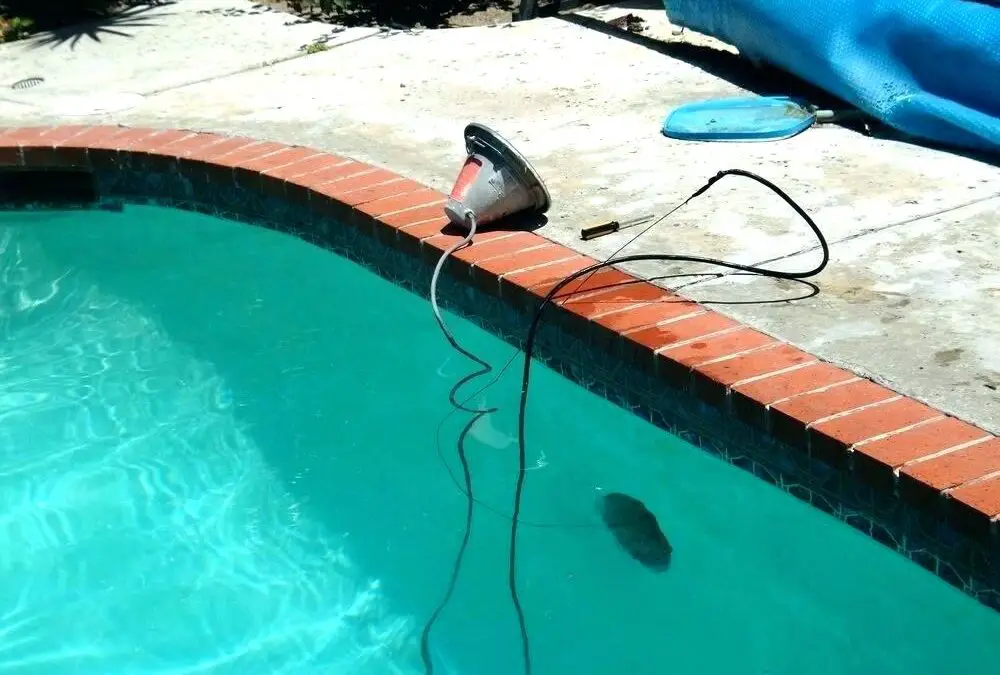If you own an inground swimming pool most if not all these pools have a pool light that besides lighting up the pool water at night can create a beautiful landscape in the dark making your pool a beautiful piece of art inviting you to jump in. But one of the biggest fears about pool lights is What Happens If Water Gets into the Pool Light?
If water gets into the light, it’s dangerous, electricity in underwater lights can cause electrocution. Once the water reaches the socket, it will trip the GFI & which will be the extent of the shock hazard, the leak could be (lens) gasket related or a conduit leak & should be repaired immediately.
While pool lights are generally safe to use, they should always be installed and serviced by a professional, licensed electrician. The biggest potential for danger comes from the light in the pool itself since it is underwater and directly connected to the household current.
What Happens if Water Gets Into Pool Light
Swimming Pool lights are designed to be installed below the water level and so obviously are sealed to prevent pool water from getting into the pool light fixture. But sometimes those seals and gaskets can fail, and you might notice that you see pool water through the glass lens. They are designed to be waterproof and submersible. Look for bulbs with an IP67 or higher to ensure they are safe to operate underwater.
If there is water inside the lens of the pool light, which you can usually see from the on-deck, that doesn’t mean that the light is leaking, but it does mean that the lamp gasket has failed, letting water leak inside and surrounding the bulb.
You’ve got a live current of 120 volts and some water inside the fixture, which could conduct that current, which is sufficient to electrocute you. In theory, it should be protected by a ground fault circuit interrupter (GFCI) that separates the circuit from the main breaker which should trip.
If your lights are more modern they are low voltage lights connected to a transformer, that steps it down 120 volt AC to 12 volt DC the ‘danger’ to yourself is much lower. You can still get shocked, but it’s unlikely to kill you.
If the pool water leaks into the pool light either way the GFI should engage and shut the power down between the pool light and whatever power AC or DC is energizing the light. The smallest amount should trip the GFI protecting the circuit between the GFI and the main breaker.
How Do You Replace a Pool Light?
- Turn on the pool light-Shut main breaker off to the swimming pool-light-pool light will turn off
- Remove Screw Holding Light Housing
- Remove the Light Housing
- Loosen Other Screws
- Remove Original Bulb
- Install the Replacement Bulb-LED low-voltage pool light
- Replace Pool Light Housing ……………………………………………………………. Read more
How To Seal Pool Lights
Pool Lights are normally protected by a gasket located between the glass lens and the housing. It should be replaced periodically typically when you replace the bulb in the fixture. There are sealants that are used for leaks in the pool light housing and especially in the conduit that feed the light.
Water can get into the hole that carries the conduit. This is often a slow leak. Most frames holding the light can and lens cover are attached with screws that can be easily removed if it is necessary to change the light bulb. The frame must be attached to the pool wall very tightly to prevent leaks.
This is when the openings are susceptible to pool water leaks when pulling the light and cable out of the pool to change the bulb. Most professionals use a product called butyl tape for conduit leaking. Watch this video.
Can You Replace a Pool Light Underwater?
Yes, Replacing pool lights for your in-ground pool does not require draining the water from the pool or hiring a professional. The design of the pool light’s housing and the length of the housing wiring allows you to easily remove it from the pool …………………………………………………………. Read more
They come in two sizes to fit either ¾-inch or 1-inch conduit, so check your light manual to see which size you need. These tight rubber seals are designed to perfectly fit your cable and act as a plug for the conduit. They have a slit, so you can peel them open to fit them around the cable and then push them tightly into the hole.
How Much Does it Cost to Change a Pool Light?
To replace a pool light yourself, you’ll spend about $100 to $500 for the replacement light and bulb, or about $20 to $100 for just the light bulbs. If you’re not sure about doing some minor electrical work then, Pool light replacements may cost around $450 to $1,700, depending on the light type ……………………………………………. Read more
JimGalloway Author/Editor

